(Tami Nutall Jefferson, a married mother and grandmother, is going back to school and she has invited us all along to enjoy the ride. For more posts in this series, click here: Tami’s Big Do Over. – ABT )
By Tami Nutall Jefferson
Whether you’re reciting the opening of Hamlet’s soliloquy – “to be or not to be” – or humming Black Sheep’s hook inside your head – “you can get with this or you can get with that” – the bottom line always comes down to ‘WHY?”
Why is being this better than being that? Why is doing this better than doing that? For me, the “why” was “why go back to college, at all, at this point in my life?”
Flashback — It’s Me
Last year, I read an article about this 50-something year old person who spent their lifetime transforming themselves from a man into a woman. In the end, they were ravaged emotionally and physically and a shell of their real self. The one thing they lamented was how, throughout their whole journey, no one had ever asked them why they were doing what they were doing. All he/she got was support.
In preparing for this conversation with you this month, I realized I, too, have been that person. The person that everyone trusted to make her own best choices. Everyone I knew, pretty much always supported me. No one ever really questioned or challenged me or my “why.” I always thought it was a blessing. Now I’m reconsidering.
Unlike ever before, when it comes to going back to school, everyone has started asking me “Why?” Almost all of my friends and business associates – even my own husband – everyone is asking me “why?”
I have been answering the incessant “why” question for the last 6 months. For the first time in my life, I have to defend my “why.” It was easy to defend it to myself in February when I first asked myself the question. “Because this is what I’ve always wanted to do and because this is what I came back to Texas in 2011 to do. So I’m doing it.” But on the other side of 30, you somehow loose the privilege of having “I don’t know” and “Because I want to” as your reasons “why” for doing almost anything.
No One Wants a Weak Why
I have invested over a hundred hours the last few months going through my old journals and goals lists, the TAMU course catalog and syllabi, professor CVs, advertised industry job descriptions, and the like. I have accumulated a paper ream of goals and plans written out over the years that all pretty much say the same three or four things. All of this, to get to my “why.” Through the practice of researching my ‘Why?’ I went even farther and took time to research the objects of my affection. It’s one thing to really want something or whatever your “why” is. It’s a whole other thing to really count the cost of being, doing, and having that thing. You might find that your “why” is not strong enough to withstand the test of living and – in Silicon Valley terms – you might have to pivot.
Tami’s Choice
I planned on studying real estate development, urban planning, AND economic development and having a career doing all three. I began to ask myself, “In light of the fact that I can only take a limited number of elective credits, why do I REALLY want to take each of these subject matters instead of focusing on one specific one? Furthermore, what does each job truly entail?”
I read at least 50 job listings and resumes for these professions, as well as their respective trade associations and certification webpages. Conclusion – These are three completely different jobs with three completely different skill sets done by three completely different types of people. I’m only one of me! I can’t effectively do them all. I have to choose. So how do you choose? My life experience tells me if I go with choice B or C, then I’m always going be to distracted from my work and trying to figure out how I can jump the fence to choice A. I don’t have another 20 years to chase choices B, C, D, or Z. My time is now – or never, to be totally honest with myself. Researching and answering this hard “why” question has set me on a more attainable path with regard to my major and minor courses, my capital, my professional relationships, business endeavors, and so on. I essentially saved myself thousands of wasted hours and dollars, and secured my future Level 10 happiness. I pivoted – and it was okay. It was actually empowering. And my resolute “WHY” grew just a little bit more.
It’s The Big One
That’s great. But that still leaves the big WHY? unanswered. Why go to college in the first place? Every student has to answer this question – whether they’re 17 or 70. Often we ask it of ourselves as we’re pouring over some inane text at 2:00 am. This is where the “21 reasons why” come rolling out of my mouth. My “whys” range from the technical – learning more so I can earn more, to the passionate – my childhood dream, to the practical – I don’t want to be dumbed out of the future workforce. But as I look at them, there is no one Big Why. My “why” is like a pie, it takes many pieces to make up a whole one. There is no perfect blanket answer that will appease every asker. But if I know anything about life, it’s that any one of my 21”whys” will smack me square in the face when I’m faced with its opposition. Like a time, when I see the perfect job posting with educational requirements. Or if I should travel to Greece and see the hotelier’s TAMU degree on their office wall. Or when…
No matter what the occasion, audience, or location, my “why” has to be resolute, well-researched, and able to stand up to the caring people who ask and the dissident people who oppose it. That is something you don’t learn when everyone in your life, for your whole life, just blindly supports you without ever sincerely questioning you. That is something I’m learning now, and it’s something that I know will make me a strong leader.
And The Beat Goes On
I’ve been struggling all day with how to wrap this up in a nice, little bow. A well-versed conclusion. And I finally realize, as deadline approaches fast, there is no conclusion. This is the beginning. I’m only at the beginning of learning my “whys” and having them be real to me. I have 5 semesters to go and I’m excited to see what “whys” they will bring up. Especially that first semester. So until next time…
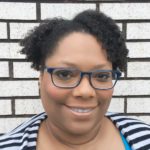 Tami Nutall Jefferson has over a decade of experience in real estate sales and management and currently works as a home and building designer. This Fall she will begin her first academic year at Texas A&M University pursuing a Bachelor’s Degree in Urban Planning and Real Estate Development while commuting between Waco and College Station. Her hope is that Waco becomes the most attractive, modern, vibrant, and prosperous version of itself as an inclusive city and her professional mission is to help make that happen. Tami is also a 2017 graduate of the Leadership Plenty Institute and volunteers her time and voice to many downtown Waco placemaking and economic development causes and organizations.
Tami Nutall Jefferson has over a decade of experience in real estate sales and management and currently works as a home and building designer. This Fall she will begin her first academic year at Texas A&M University pursuing a Bachelor’s Degree in Urban Planning and Real Estate Development while commuting between Waco and College Station. Her hope is that Waco becomes the most attractive, modern, vibrant, and prosperous version of itself as an inclusive city and her professional mission is to help make that happen. Tami is also a 2017 graduate of the Leadership Plenty Institute and volunteers her time and voice to many downtown Waco placemaking and economic development causes and organizations.
To engage and share your non-traditional student experiences with Tami, contact her at [email protected] or connect with her on Facebook https://m.facebook.com/tami.nutall1
By Rachel E. Pate
2017 has seen a summer filled with action-packed heroic blockbusters. From Wonder Woman and Spiderman to the Justice League and Guardians of the Galaxy, there’s a big screen hero for each one of us. I recently watched the new Power Rangers movie and was transported back to my childhood, embracing every character and rooting for the heroes. There was one scene, however, that despite all the movie majesty just didn’t play to my adult sensibilities.
Spoiler alert…
It’s the scene in which Billy, the quirky super-smart blue ranger, was tragically drowned by the evil villainess Rita – who, by the way, was quite a bit more fierce than her predecessor on the original television show. The remaining rangers pulled his lifeless body from the water; they laid him on his back and looked on hopelessly at his motionless frame. That’s when the “adult alarm” sounded in my head, and I immediately questioned why no one attempted to perform CPR on Billy. This sad situation in the movie was eventually rectified by their great and mighty mentor Zordon, but real-life heroes have only seconds to think and react. The first responders of the community, our firefighters, law enforcement and emergency medical personnel, save lives daily with sometimes only moments to spare.
On Saturday, July 8th between the early morning hours of 3 a.m. and 4 a.m., an unnamed hero sprang into action to save a fellow citizen. Curtis Jefferson of Rockford, IL, was staying at a Waco-area hotel and was headed through the lobby when he said he witnessed two patrons, a man on crutches and a woman, administering CPR to the front desk attendant. The manager had suffered an apparent heart attack while assisting the customers and the gentleman on the crutches leapt over the desk to perform life-saving measures. The two patrons were able to provide aid to the hotel employee until the ambulance and paramedics arrived. In Mr. Jefferson’s words, “The (male) patron saved his life by performing CPR.” It was in speaking with the female patron afterwards that Mr. Jefferson learned that the mysterious man on crutches was in fact a trained first responder, a firefighter paramedic, and he’d vanished after all the commotion died down without any hoopla or cheering fans. He simply did what needed to be done and moved on.
There are tons of local heroes who suit up daily to battle real world crises; burning blazes, horrific accidents, medical emergencies and more. Often times, their stories go unannounced and these heroes return home after work to manage their lives as ordinary citizens. They deserve our support and thanks.
They are due our appreciation for their willingness to answer the call whether on-duty or off.
They are actually due much more than our gratitude, but we can offer at least that. The Cen-Tex African American Chamber of Commerce will host its first We Say Thanks- First Responder Appreciation Event on Tuesday, July 25th from 5 p.m. to 7 p.m. at Hilton Home2 Suites located at 2500 Bagby Avenue in Waco. The event will feature local first responders and include networking and catered refreshments.
 Rachel E. Pate is a native Wacoan and 1999 graduate of University High School. She currently works as the Public Relations person for the Cen-Tex African American Chamber of Commerce and serves as Coordinator for the Esther’s Closet program for women. She’s also a proud mom of one, lifelong member of Toliver Chapel (TCMBC) Church, lover of the great outdoors, avid sports fan and dedicated wearer of Converse’s Chuck Taylor shoes.
Rachel E. Pate is a native Wacoan and 1999 graduate of University High School. She currently works as the Public Relations person for the Cen-Tex African American Chamber of Commerce and serves as Coordinator for the Esther’s Closet program for women. She’s also a proud mom of one, lifelong member of Toliver Chapel (TCMBC) Church, lover of the great outdoors, avid sports fan and dedicated wearer of Converse’s Chuck Taylor shoes.
The Act Locally Waco blog publishes posts with a connection to these aspirations for Waco. If you are interested in writing for the Act Locally Waco Blog, please email [email protected] for more information.
by CeRon Ford
Cheeseburgers and French fries have you down in the gutter? Tired of paying for expensive salads at drive-thru restaurants? Do you want to work out but not sure where to go? No need to waste any more time searching for the most affordable salad or settling for just any gym– we have everything mapped out just for you!
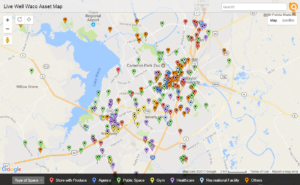 Ever heard of the Live Well Waco (LWW) Asset Map? No? Well, you may want to pay close attention to this. Live Well Waco is a coalition dedicated to improving the health of people living, working and playing in McLennan County. The Live Well Waco Coalition began more than 5 years ago as a collaborative effort between community businesses, organizations, and individuals who are dedicated to the health of McLennan County residents. LWW focuses on improving area health disparities by hosting events such as community cooking demonstrations, physical activity programs, and more. The Live Well Waco Leadership team created the asset map to promote a better understanding of diversity within the community while helping community members locate fresh produce and healthy foods, exercise facilities, healthcare facilities, and other local resources.
Ever heard of the Live Well Waco (LWW) Asset Map? No? Well, you may want to pay close attention to this. Live Well Waco is a coalition dedicated to improving the health of people living, working and playing in McLennan County. The Live Well Waco Coalition began more than 5 years ago as a collaborative effort between community businesses, organizations, and individuals who are dedicated to the health of McLennan County residents. LWW focuses on improving area health disparities by hosting events such as community cooking demonstrations, physical activity programs, and more. The Live Well Waco Leadership team created the asset map to promote a better understanding of diversity within the community while helping community members locate fresh produce and healthy foods, exercise facilities, healthcare facilities, and other local resources.
The asset map includes a list of locations that provide access to healthy living opportunities all within the City of Waco. With the LWW Asset Map, we want to help protect and conserve the local traditions, customs, and resources that are prevalent in Waco, Texas.
Maps can often be tricky, but the best way to learn is just to dive in!
Here’s the link: www.batchgeo.com/map/livewellwaco
And here are some tips for using it! :
Use the drop-down box located in the bottom left hand corner to select the category that you want to search. The 4 categories are type of space, quality, neighborhood, and amenities. To narrow down the locations shown in the map, you can select one group or multiple groups shown as the colorful circles to the right of the drop down box. For example, “Type of Space” would be the category, and “Store with Produce, Agency, and Public Space” would be considered groups. You can further target your search or search by other criteria by changing the category from the drop down box and selecting additional groups to the right of the box. As you select the groups, they appear in gray boxes, and if you want to delete a selection, just click the “X” on the left hand side of the gray box.
Here is what you will find within each category.
Type of Space:
- Stores with produce- includes grocery and convenience stores
- Agency- social service agencies
- Public Space- free space for exercise such as parks
- Gym- locations of gyms to engage in physical activity
- Healthcare- locations to access health screenings or vaccinations
- Recreational Facility- locations of community centers
- Other- locations that do not fit into the previous categories such as libraries where access to a computer is available
Quality:
- Healthy Living- includes locations for accessing healthy lifestyles
- Healthy Eating- includes locations with fresh produce or healthy food options
- Active Living- includes locations that offer free or low cost opportunities to exercise
Neighborhood: If applicable, the locations are broken into which neighborhoods the assets are located. For example: Lacy Lakeview, Kendrick, Bellmead, University, Waco and Others.
Amenities: If available, different assets are listed such as locations where playgrounds are located. For example: Playgrounds, outside fields, Library, fresh produce, school w/ playground, Playgrounds and Others.
The colorful circles on the map represent the groups within the different categories you have selected, which is shown in the image below. Click on a circle inside the map to see detailed information about the location. To look at another location click the “X” on the right hand side of the box or simply click on another circle.
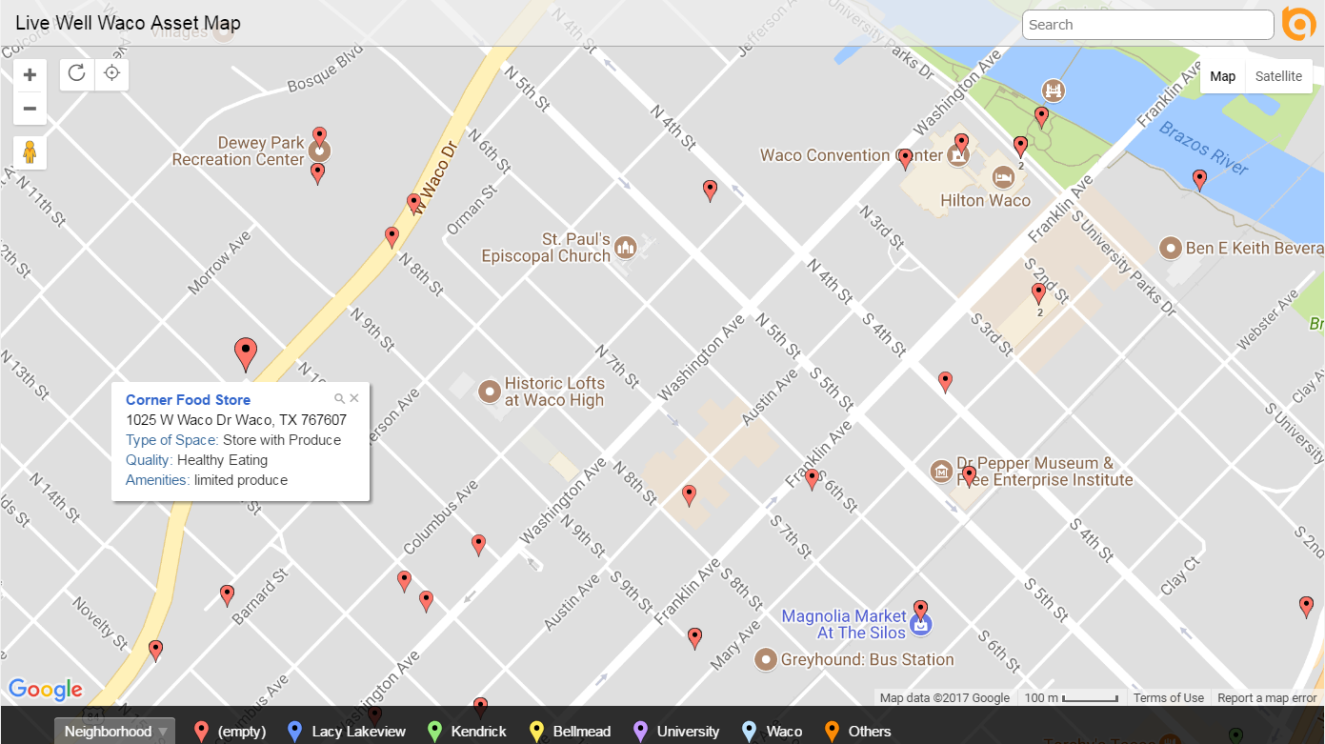
To view a list of all the locations shown on the map, first, make sure your cursor is not hovering over the map and then scroll down the page. Under the black square you will see the locations itemized in a list format. This list will change as you select specific categories and groups. You can also use the scroll bar located on the right hand side of the page.
To zoom in and out of a specific area on the map: (1) Use the + and – signs located on the left hand side of the map (2) Click on the map in the area with the circles and use your mouse to scroll forward to zoom in or backwards to zoom out.
The Live Well Waco Asset Map is an awesome tool that helps providers and community residents identify assets and strengths around the community. Types of resources are clearly and easily categorized into stores with produce, local agencies, public spaces, gyms, healthcare facilities and recreational facilities across the great City of Waco, Texas. The LWW Asset Map can save you time and money as well as improve your quality of life, so let’s SHARE it! By promoting the LWW Asset Map tool within local clinics, doctor’s offices, local food banks, and through other local organizations, we can provide this asset map as a public service to the entire community so that patients, clients, and partners can support and encourage one another to make healthier lifestyle choices. The LWW Asset Map is already linked to the Live Well Waco website, but the opportunity to spread awareness of this great resource on other organizations’ and partners’ websites will go a long way.
The Asset Map tool not only provides a visual representation of local businesses and resources, but it also provides valuable information that will ultimately help all community residents lead a healthier lifestyle. The time to improve healthy eating and increase physical activity is NOW! Let the Live Well Waco Asset Map guide you to health and success! Although the journey is not easy, Live Well Waco Coalition challenges you to take the highway and merge into a healthier lifestyle!
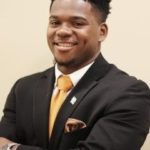 CeRon Ford moved to Waco in August 2013 to attend Baylor University. He received his Bachelors of Science in Public Health, and had the opportunity to intern at the Waco-McLennan County Public Health District as a Live Well Waco intern during his final summer in Waco. CeRon will further his efforts of pursuing public health by attending Morehouse School of Medicine’s Master of Public Health Program in Atlanta, Georgia, In the Fall 2017.
CeRon Ford moved to Waco in August 2013 to attend Baylor University. He received his Bachelors of Science in Public Health, and had the opportunity to intern at the Waco-McLennan County Public Health District as a Live Well Waco intern during his final summer in Waco. CeRon will further his efforts of pursuing public health by attending Morehouse School of Medicine’s Master of Public Health Program in Atlanta, Georgia, In the Fall 2017.
The Act Locally Waco blog publishes posts with a connection to these aspirations for Waco. If you are interested in writing for the Act Locally Waco Blog, please email [email protected] for more information.
For many years, Sanger Avenue Elementary School stood as the most familiar landmark of the Sanger Heights neighborhood. Located in the “Silk Stocking District,” Sanger Avenue Elementary acquired a reputation as one of the premier educational institutions in the city.
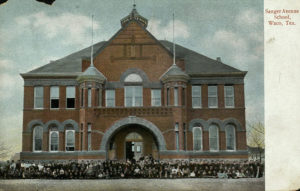 A 1903 bond election resulted in the construction of three nearly identical schools. Sanger Avenue School, designed by renowned Waco architect Milton W. Scott, long outlasted its counterparts Bell’s Hill and Brook Avenue Elementary Schools. The two-storied building featured unique architecture and elaborate design, including ornate arches, a rotunda, an upstairs auditorium, and a high roof crowned by a cupola. The building’s heavily Romanesque style included arched windows and doors framed by limestone. Prominently featured turrets stood at the front of the original school building but were removed in a 1930 renovation.
A 1903 bond election resulted in the construction of three nearly identical schools. Sanger Avenue School, designed by renowned Waco architect Milton W. Scott, long outlasted its counterparts Bell’s Hill and Brook Avenue Elementary Schools. The two-storied building featured unique architecture and elaborate design, including ornate arches, a rotunda, an upstairs auditorium, and a high roof crowned by a cupola. The building’s heavily Romanesque style included arched windows and doors framed by limestone. Prominently featured turrets stood at the front of the original school building but were removed in a 1930 renovation.
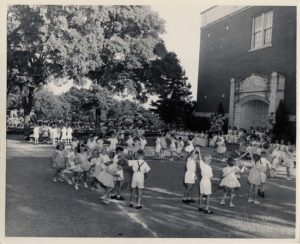 Sanger Avenue School opened in 1904 with John H. Richardson as its first principal. Former students and teachers generally agree that the most influential figure in the history of Sanger Avenue was likely Nina Glass, the school’s second principal. Glass encouraged parents and students to take an active role in education, establishing a mimeographed newsletter for parents called the Ginger Jar and inviting students to save coupons to buy pictures for the school. She published a nationally used arithmetic textbook and frequently attended educational conferences. Well liked by both staff and students, Glass was often seen at the school’s annual May Fete festival, brightly garbed and leading students in a parade around the Maypole.
Sanger Avenue School opened in 1904 with John H. Richardson as its first principal. Former students and teachers generally agree that the most influential figure in the history of Sanger Avenue was likely Nina Glass, the school’s second principal. Glass encouraged parents and students to take an active role in education, establishing a mimeographed newsletter for parents called the Ginger Jar and inviting students to save coupons to buy pictures for the school. She published a nationally used arithmetic textbook and frequently attended educational conferences. Well liked by both staff and students, Glass was often seen at the school’s annual May Fete festival, brightly garbed and leading students in a parade around the Maypole.
Glass’s enthusiasm reflected the general atmosphere at Sanger Avenue Elementary. Former students fondly remember dedicated teachers and classrooms ideally suited for learning. Large windows poured light into classrooms where each student’s cast-iron and wooden desk held an inkwell. A spacious and well-stocked library, established after Glass attended a Chicago educators’ conference, invited students to study and read.
The years following Glass’s retirement from Sanger Avenue brought great changes for the small elementary school. By the 1960s, over seven hundred students attended the school, and music classes and a choir were established. Yet the Waco Independent School District (WISD) announced plans for the school’s closure as a part of a busing plan to meet a federal desegregation order. By the 1970s, African American students made up approximately half of the school’s population. Despite the efforts of many to keep the school open, classes ceased at Sanger Avenue in 1974.
Although a portion of the school briefly housed a Head Start program, much of the building soon suffered from years of disuse. Disappointed at seeing such an important piece of Waco’s history sit vacant, Waco attorneys LaNelle and John McNamara purchased the school for $80,000 from WISD. The couple renovated the building, installing a new roof, boarding up broken windows, and removing asbestos. Yet despite their hopes of repurposing the building, perhaps as a charter school, the plans never came through. Another blow was dealt to the historic building when arsonists set fire to it in 2008.
The city of Waco deemed the building unsafe, and in 2010 bulldozers tore the remnants of the structure down, leaving only the entrance archway standing. The school’s former location has been featured in the Waco Trib recently as a possible location for an indoor soccer field.
Cite this Page:
Karen Green and Cheryl Wiggington, “Sanger Avenue Elementary School,” Waco History, accessed July 19, 2017, http://www.wacohistory.org/items/show/112.
 Waco History is a mobile app and web platform that places the past at your fingertips! It incorporates maps, text, images, video, and oral histories to provide individuals and groups a dynamic and place-based tool to navigate the diverse and rich history of Waco and McLennan County. It is brought to you by the Institute for Oral History and Texas Collection at Baylor University. This post: Prisca Bird, “Lovers’ Leap,” Waco History, accessed June 21, 2017, http://www.wacohistory.org/items/show/38.
Waco History is a mobile app and web platform that places the past at your fingertips! It incorporates maps, text, images, video, and oral histories to provide individuals and groups a dynamic and place-based tool to navigate the diverse and rich history of Waco and McLennan County. It is brought to you by the Institute for Oral History and Texas Collection at Baylor University. This post: Prisca Bird, “Lovers’ Leap,” Waco History, accessed June 21, 2017, http://www.wacohistory.org/items/show/38.
The Act Locally Waco blog publishes posts with a connection to these aspirations for Waco. If you are interested in writing for the Act Locally Waco Blog, please email [email protected] for more information.
By Bethie Timmons
The Latino Mental Health Coalition is a group of individuals who identified a need within the Latino faith community to address mental health issues occurring in the context of the church. Many individuals go to their church leaders first when they are experiencing mental health concerns or family struggles and knowing how to serve people well in these difficult situations, beyond offering spiritual support, can be life-saving and life-changing. Many individuals and families in the Latino culture do not talk about mental health due to fear of the stigma of being called “locos.” There might be a lack of understanding of the signs or symptoms so feelings are dismissed. Many in the Latino community have been taught that private “home” matters should not be taken outside the home. Strong cultural traditions exist and it may be that someone in the family has sworn by the “jarabe the tia lupe” or VapoRub. And although these might work for many illnesses, individuals need to be aware of the limitations. Drinking tea for nerves to soothe oneself is good, but those nerves could be a sign of something more troubling. In light of the current immigration focus of our nation many immigrants who might be here illegally and fear deportation may be hindered from being open about their health. Also, many immigrants, whether legal or illegal, work independently or have low-wage jobs which affect their ability to get medical insurance.
Pastors are doing a great job in addressing spiritual concerns of their congregations but felt inadequately trained to handle mental health needs. Their commitment to becoming informed about mental health issues including anxiety, depression, suicide prevention and substance abuse led them to reach out to Baylor University’s Diana R. Garland School of Social Work and Dr. Dennis Myers to gather pastors and mental health professionals in the community to assist in addressing this very important issue in their churches.
Pastor Ruben Andrade of Family of Faith Worship Center has led the charge and has been instrumental in engaging pastors and their congregations. Last year the coalition hosted a conference at the Garland School of Social Work titled “Mental Health: Tools for the Church.” We hosted approximately 75 people and included breakout sessions, information tables identifying community mental health agencies and a panel made up of local pastors who spoke about the need for mental health awareness in their congregations. Our keynote speaker talked to the attendees about being a survivor of a family member who completed suicide. Her presentation was powerful. Attendees agreed that the conference was a big success and decided that an annual offering would benefit the community. One attendee who was very inspired by the information shared at the conference went on to become a Mental Health First Aid Certified Trainer and is now working with Latino churches in South Texas.
The conference opened up conversation about mental health issues and provided pastors and other church leaders the opportunity to speak openly about mental health and the challenges of addressing this issue in their churches. It was agreed that there is a stigma associated with mental health and while pastors are very aware of the challenges persons with mental health issues encounter, they were not sure about how to best address concerns in the context of the church. The conference also provided pastors and church leaders the opportunity to connect with local community mental health providers and their referral process for connecting one of their parishioners.
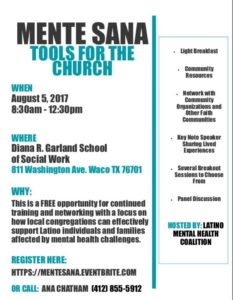 The success of the conference provided an impetus to continue this important work among the Latino community through the coalition. We have provided additional training in the churches around mental health first aid, suicide awareness and prevention and our local chapter of NAMI has presented support information for families who care for individuals with mental health issues. We also identified the need for Spanish speaking counselors and have developed a presentation to recruit Latino college students into the counseling profession. AND on August 5, 2017 at Baylor University’s Diana R. Garland School of Social Work the coalition will host the 2nd annual “Mente Sana: Tools for the Church.” We are excited to continue this important conversation with a panel, workshops and a keynote speaker. To register for the conference which is free of charge go to https://mentesana.eventbrite.com.
The success of the conference provided an impetus to continue this important work among the Latino community through the coalition. We have provided additional training in the churches around mental health first aid, suicide awareness and prevention and our local chapter of NAMI has presented support information for families who care for individuals with mental health issues. We also identified the need for Spanish speaking counselors and have developed a presentation to recruit Latino college students into the counseling profession. AND on August 5, 2017 at Baylor University’s Diana R. Garland School of Social Work the coalition will host the 2nd annual “Mente Sana: Tools for the Church.” We are excited to continue this important conversation with a panel, workshops and a keynote speaker. To register for the conference which is free of charge go to https://mentesana.eventbrite.com.
Growing up in El Paso, TX, my family and I had the distinct pleasure of living on the border and within sight of Juarez, Mexico. We took many trips to Juarez especially when family from other parts of the country visited to experience the culture and traditions of our sister city. The marketplace and the grocery store where you could buy the best hard rolls was always a hit. The other opportunity for me to experience the rich Latino culture was spending time with my best friend and her family. I made it a point to show up at her house at dinner time so that I could partake in a regular staple of their family meals, homemade tortillas! There is nothing like a homemade tortilla and if you have never experienced one you are truly missing out. What was unique about her family was their strong cultural identification that included numerous family celebrations and their honor to the matriarch in the family, her grandmother. I remember the grandmother as being a tiny woman with a soft voice who could silence a room with her words. She only spoke Spanish so I did not know exactly what she was saying but understood that it was important and that you had to listen. The love and support that existed within this large extended family was something to envy. This family stood by one another no matter what. Their faith community was also an integral part of their living and Sundays in this family was an all-day affair. When a family member experienced a problem the rest of the family gathered and provided assistance or called in the priest to provide direction. However, in looking back I can see how major difficulties were handled in isolation because one simply did not take problems outside of the family. It is through the coalition that we hope equip pastors and church leaders to encourage families to reach outside for help when needed.
 Elizabeth (Bethie) Timmons is a Licensed Clinical Social Worker and the Director of Clinical Services at HOTRMHMR. She has lived in Waco for 32 years and has been involved in a variety of capacities with the children and families of McLennan County, providing therapy and support. Her specialty includes trauma and mental health issues.
Elizabeth (Bethie) Timmons is a Licensed Clinical Social Worker and the Director of Clinical Services at HOTRMHMR. She has lived in Waco for 32 years and has been involved in a variety of capacities with the children and families of McLennan County, providing therapy and support. Her specialty includes trauma and mental health issues.
The Act Locally Waco blog publishes posts with a connection to these aspirations for Waco. If you are interested in writing for the Act Locally Waco Blog, please email [email protected] for more information.
By Katie Schaeffer
Jimmy Dorrell, CEO at Mission Waco, believes that “creation care” is not a side bar issue, but rather, “Christian justice demands that the creation must be protected, because every thing and every person is made in the image of God.” That is why he has worked tirelessly to put together Mission Waco’s Urban REAP (Renewable Energy & Agriculture Project). The project has commercial composting, rainwater harvesting and purification, solar power, an aquaponics greenhouse, raised grow beds, and a small training center for groups to come learn as a part of Mission Waco’s effort to be about “creation care.”
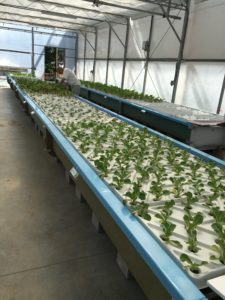 The passion Jimmy has about the privilege and responsibility God has given mankind to care for and harness his good gift of creation, and not abuse it for personal gain is based on the cultural mandate found in Gen 1:28, where he believes we receive God’s expectation that everyone should be good stewards of creation. Jimmy was also profoundly influenced in this area by the teaching of theologian Francis Schaeffer, who among many things, wrote Pollution and the Death of Man (1970). Jimmy recently posted on Urban REAP’s facebook page, a quote from the book, in which Schaeffer suggests that many in the church need an ecological conversion, “lamenting that much of evangelical Christianity had adopted a dualistic view of the world that did not take nature seriously.” He posted “For Francis Schaeffer, our shared finiteness created a bond of common grace with the rest of creation that calls for responses of stewardship, regardless of one’s religious worldview.” In another post, Jimmy expresses why creation care is so important, “Statistics profoundly show global deterioration of God’s perfect ecology that affect basics of food, water, land and weather”. He hopes that Mission Waco’s efforts in addressing these issues, will encourage individuals and corporations in Waco and the country to think about their impact on our ecology and what changes they can make to be better stewards of God’s great gift.
The passion Jimmy has about the privilege and responsibility God has given mankind to care for and harness his good gift of creation, and not abuse it for personal gain is based on the cultural mandate found in Gen 1:28, where he believes we receive God’s expectation that everyone should be good stewards of creation. Jimmy was also profoundly influenced in this area by the teaching of theologian Francis Schaeffer, who among many things, wrote Pollution and the Death of Man (1970). Jimmy recently posted on Urban REAP’s facebook page, a quote from the book, in which Schaeffer suggests that many in the church need an ecological conversion, “lamenting that much of evangelical Christianity had adopted a dualistic view of the world that did not take nature seriously.” He posted “For Francis Schaeffer, our shared finiteness created a bond of common grace with the rest of creation that calls for responses of stewardship, regardless of one’s religious worldview.” In another post, Jimmy expresses why creation care is so important, “Statistics profoundly show global deterioration of God’s perfect ecology that affect basics of food, water, land and weather”. He hopes that Mission Waco’s efforts in addressing these issues, will encourage individuals and corporations in Waco and the country to think about their impact on our ecology and what changes they can make to be better stewards of God’s great gift.
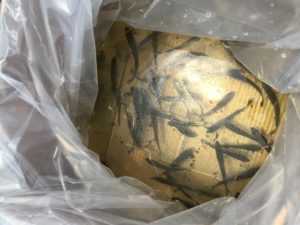 Ground breaking for the Urban REAP project, which was funded mostly through a generous grant from Green Mountain Energy Sun Club, began on January 18th, 2017. Every month since has seen the anticipated additions of the project come together. Just this week, 315 Hybrid Striped Bass fingerlings were added to the aquaponics system, which will provide organic produce to Jubilee Market, and up to 500 lbs of fish and 720 pounds of crawfish annually. Next week the commercial composter arrives which will turn biodegradable waste from Jubilee market, local restaurants and businesses into compost. This compost will be available for purchase at the upcoming greenhouse nursery behind Jubilee Market.
Ground breaking for the Urban REAP project, which was funded mostly through a generous grant from Green Mountain Energy Sun Club, began on January 18th, 2017. Every month since has seen the anticipated additions of the project come together. Just this week, 315 Hybrid Striped Bass fingerlings were added to the aquaponics system, which will provide organic produce to Jubilee Market, and up to 500 lbs of fish and 720 pounds of crawfish annually. Next week the commercial composter arrives which will turn biodegradable waste from Jubilee market, local restaurants and businesses into compost. This compost will be available for purchase at the upcoming greenhouse nursery behind Jubilee Market.
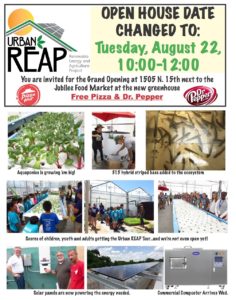 Come see and learn about all of these developments at Urban REAP’s Grand Opening on August 22nd from 10am-12pm. Those who can’t make it are always welcome to drop by for a quick tour and sign up to be a volunteer! All this news and much more can be found on Urban REAP’s Facebook page: mwurbanreap, and Mission Waco’s website.
Come see and learn about all of these developments at Urban REAP’s Grand Opening on August 22nd from 10am-12pm. Those who can’t make it are always welcome to drop by for a quick tour and sign up to be a volunteer! All this news and much more can be found on Urban REAP’s Facebook page: mwurbanreap, and Mission Waco’s website.
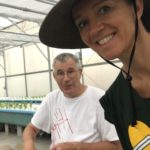 Katie Schaeffer and her husband Rick consider it a real privilege to be managing Mission Waco’s amazing Renewable Energy Agricultural Project (REAP). Katie and Rick came to Waco at the end of 2015, from CA. This week they are moving into a house they have been renovating, just a few blocks from Mission Waco and are really looking forward to being part of the neighborhood community. Katie is happiest being in nature and tending to plants, and eating good food with friends and family. She and her husband Rick are also grateful for the privilege and deep joy of raising two sets of twin boys, who are now amazing 23 & 24 year old men. That is Tony in the photo with Katie. He is her “angel” volunteer who is there everyday she is, and the reason the aquaponics greenhouse is so beautiful and well run.
Katie Schaeffer and her husband Rick consider it a real privilege to be managing Mission Waco’s amazing Renewable Energy Agricultural Project (REAP). Katie and Rick came to Waco at the end of 2015, from CA. This week they are moving into a house they have been renovating, just a few blocks from Mission Waco and are really looking forward to being part of the neighborhood community. Katie is happiest being in nature and tending to plants, and eating good food with friends and family. She and her husband Rick are also grateful for the privilege and deep joy of raising two sets of twin boys, who are now amazing 23 & 24 year old men. That is Tony in the photo with Katie. He is her “angel” volunteer who is there everyday she is, and the reason the aquaponics greenhouse is so beautiful and well run.
The Act Locally Waco blog publishes posts with a connection to these aspirations for Waco. If you are interested in writing for the Act Locally Waco Blog, please email [email protected] for more information.
.
(A follow-up to https://actlocallywaco.org/2016/07/19/service-learning-at-indian-spring-helping-kids-learn-to-be-citizens/)
By Travis Cheatham
Last July I wrote a blog about what service learning looks like at Indian Spring Middle School (ISMS). I explained the structure, the value, and the potential of the program. Today I write about the rewards, challenges, and opportunities of this last year through a few stories. (Names have been changed to protect student identities)
Rewards
Ava is a good student in class but she’s the queen of eye rolling. Throughout the year, I frequently had to coax Ava to get to her service learning group, which ironically she liked, but for some reason, she frequently dawdled in attending. This, by the way, is a common theme among students and is really a fact of life for middle schoolers.
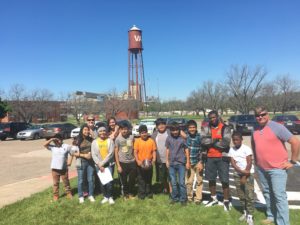 In March, our school planned an event with the VA Medical Center thanks to funds from The Meadows Foundation. Our students decided to use the funds to donate plants, games, and activities for VA residents. Ava was sure to help out with all of the last minute preparations and came to the event on a Saturday morning, no less. The following Monday morning, I was poised at the school’s main entrance to greet students (as I usually do) and Ava came running up to tell me how great a time she had. She then asked if there was any way that she could go back on her own to meet with residents.
In March, our school planned an event with the VA Medical Center thanks to funds from The Meadows Foundation. Our students decided to use the funds to donate plants, games, and activities for VA residents. Ava was sure to help out with all of the last minute preparations and came to the event on a Saturday morning, no less. The following Monday morning, I was poised at the school’s main entrance to greet students (as I usually do) and Ava came running up to tell me how great a time she had. She then asked if there was any way that she could go back on her own to meet with residents.
The lesson: Are you sharing power with your child, mentee, or student? They will relish it and will thrive. I never see our students more fulfilled at school than when they are given a task to perform. Our students have power, talent, and desire, but we have to activate it. In this next year, I hope to have more opportunities to empower our students.
Challenges
“Everyone knows service learning is boring; you’re wasting your time.” This was a common greeting from Tim as I corralled students to get to their service learning groups. I’d love to say that Tim was alone in this belief, but he wasn’t. Last year, our goal was to place all 6th and 7th graders in a service learning group based on surveys of their interests. By the time students met in their first service learning group many were confused about why they were there (even though I spent a week prepping the students).
Although middle schoolers’ decisions are inherently confusing (even to themselves), forcing students to go to something that they have no stake in is an act in vain. With no grades or requirements, our program really depended on a good hook for students’ interest and sometimes the gradual development of interest.
The lesson: This next year students will attend a service learning fair and sign up for any groups they are interested in. If they’re not interested there will be no arm twisting, but we will require students to at least take a look at their options.
Opportunities
“Hey Mike, I’m just calling to …let you know we need to cancel tomorrow due to ______
…remind you that I need you to turn in paperwork for last week’s outline
…apologize for the delay in setting up the field trip, could you do it on …”
The lesson: Although program flexibility is great, universal policies make for a well-oiled machine. As I look at the future sustainability of the service learning program I need to refine a model that can be easily administered and replicated.
How can you help?
Become a facilitator! Facilitators meet with students 1-2 hours once a week throughout the school year to guide the students in developing service projects. This year we hope to use your passions as a volunteer as the springboard for connecting students. Training will start mid-August and the program should start mid-September.
One More Good Story
Every month throughout the school year I would hold a roundtable meeting for all of our service learning facilitators to talk about upcoming events, how things were going, and to provide ongoing training. My favorite part: listening.
I’m under no delusion that I am a master of anything; do you want to know the good news for volunteers? You don’t have to be either! In those discussions, even our facilitators who were not veterans of the program contributed in a way that generated new ideas for the whole group. Those sessions produced innovative and self-critical observations which are essential for fostering real growth both individually and as a program. I am incredibly thankful for the work of my awesome volunteers and cheerleaders of this program.
Not ready to jump in? Give me a call or email and I’ll let you know about other ways to get connected at ISMS. You can also visit our website at http://indianspring.wacoisd.org/cms/One.aspx?portalId=13246&pageId=424889
to learn more about our service learning program or http://www.prosperwaco.org/mentor-coalition/ to see other ways you can mentor students in Central Texas.
 Travis Cheatham is the Service Learning Manager for Indian Spring Middle School. Before ISMS, Travis was the Executive Assistant at Mission Waco and helped lead a culinary class with the MPowerment job development program. Travis is also the Chef/Owner of Cuppa, Waco, TX a catering and food consulting business that was a regular at the farmers market in 2015. Travis is a ’06 Baylor grad who loves this community and loves to travel with his wife, Amy, whenever possible.
Travis Cheatham is the Service Learning Manager for Indian Spring Middle School. Before ISMS, Travis was the Executive Assistant at Mission Waco and helped lead a culinary class with the MPowerment job development program. Travis is also the Chef/Owner of Cuppa, Waco, TX a catering and food consulting business that was a regular at the farmers market in 2015. Travis is a ’06 Baylor grad who loves this community and loves to travel with his wife, Amy, whenever possible.
The Act Locally Waco blog publishes posts with a connection to these aspirations for Waco. If you are interested in writing for the Act Locally Waco Blog, please email [email protected] for more information.
By Scott Bland
It has been about 16 months since I was approached about helping to put together a Construction Science program at the Greater Waco Advanced Manufacturing Academy (GWAMA). There has been an amazing the amount of progress that has been made since that time a year ago.
We have received approval from the Waco ISD school board to create the Construction Science program at GWAMA with the first classes starting in August of this year. The team of people tasked with getting the program off the ground has succeeded in receiving about $200,000.00 in cash and in kind donations from the private sector to help renovate the space at GWAMA and secure the necessary tools and supplies.
Most impressively, our team, in conjunction with the Texas Association of Builders and Representative Doc Anderson, has succeeded in proposing and passing state legislation that removes the liability insurance concern regarding businesses employing paid student interns while they are in the program. This is exciting not only for the Construction Service program, but it allows all the GWAMA programs to incorporate the paid internship model for its high performing students. Not to mention what this means to career and technical programs all over the state. In a legislative session that has seen a record number of vetoes and a special session, this was an amazing accomplishment.
I believe we are seeing a turn in the general public’s perception of technical and career education. We have ignored and stigmatized this segment of our educational system for so long, the workforce shortage has reached crisis levels. This has resulted in ever increasing costs of both residential and commercial construction. The trickle down effect means the costs of housing and essentially all goods and services go up as a result to offset those costs.
The field of construction has seen a dramatic change as well. Building a home or commercial building is no longer as simple as putting up four walls and a roof. Advancements in technology mean that we can now build structures that are extremely energy efficient and wired into all the current digital demands and capable of advancing into the future with the changing technical capabilities. This means that not only do we need more workers in construction; we need highly educated workers in the workforce.
This means that our construction workforce must be better educated than ever before. The Construction Science program is the gateway to introducing our young students to a dynamic and ever changing industry that is as challenging and rewarding as any industry in our country. Our program is designed to direct students into post-graduate certification and degree programs with the background they need to be successful.
While attitudes towards jobs in the trades are seeing a dramatic turn-around, we need another common belief to begin to change as well. With the high cost of secondary education going even higher every year, the concept of the 4-year degree needs to be re-evaluated. With the senior year paid internship allowing our students to develop relationships with employers in the construction industry, it should be an easy transition from high school to advanced education while continuing to earn a wage. The shortage of qualified workers provides a strong incentive for companies in the industry to work with a young student’s work and school schedule, giving the student an opportunity to earn that advanced certification or degree without student loans.
However, working while learning comes with a cost in terms of time. Instead of thinking along the line of a traditional 2-year advanced certification or 4 year degree program, students (and their parents) should be thinking along the lines of a 4 or 6 year educational term. It should be obvious that a debt-free 6 or 7 year degree is much preferable to a 4 year degree and $150,000.00 worth of student loans.
In just a little over a year we have created a program from scratch and succeeded in passing legislation in the process. We have raised more money than the cost of a typical college degree in that time as well and seen attitudes and opinions regarding career and technical education finally begin to change. In August we will see our first students begin the journey towards changing their lives and our industry for the better.
For more information about the Construction Sciences Program, visit the website or contact Donna McKethan, Director of Career and Technical Education. Her email address is [email protected].
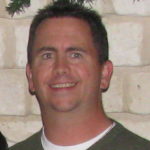 Scott Bland was born and raised in Waco. He is an alumnus of Baylor University. He worked for Highland Homes in the Dallas area from 1998 to 2001, then joined the United States Secret Service as a Special Agent after the 9/11 attacks. He retired his commission in late 2006 to return to Waco and take over the family business, Jim Bland Construction, where he has served as Owner and President of the company for the last 10 years. He is currently the President of the Heart of Texas Builder’s Association as well as a member of the Board of Directors for the Greater Waco Chamber of Commerce.
Scott Bland was born and raised in Waco. He is an alumnus of Baylor University. He worked for Highland Homes in the Dallas area from 1998 to 2001, then joined the United States Secret Service as a Special Agent after the 9/11 attacks. He retired his commission in late 2006 to return to Waco and take over the family business, Jim Bland Construction, where he has served as Owner and President of the company for the last 10 years. He is currently the President of the Heart of Texas Builder’s Association as well as a member of the Board of Directors for the Greater Waco Chamber of Commerce.
The Act Locally Waco blog publishes posts with a connection to these aspirations for Waco. If you are interested in writing for the Act Locally Waco Blog, please email [email protected] for more information.
By Kimberly Trippodo
I moved to the Waco area from Austin two years ago July 1. Prior to that, I lived in Washington DC and other similarly large cities. I saw urban centers as a sort of adult playscape, featuring subcultures to try on for size and see if any stick as community. I care deeply about non-judgement and respect for people’s self-determination, and large cities provided me with a huge range of culture, identities, and backgrounds to embrace.
When I moved to Waco, I was at the peak of a life that was quintessentially Austin. My first home in Austin was an art commune, which I shared with a writer, a couple painters, a photographer, and a carpenter. My favorite pastime at that home was playing my violin in living room jam sessions. My calendar was always packed to the gills with Austin art and nature events. On any given weekend I might participate in a hill country camping trip, a spontaneous concert in abandoned buildings and drainage piping to enjoy the acoustics, a warehouse dance party, a spoken word coffeeshop, an aerial art production, a hula hoop drum circle, an art or music festival, an effigy burn with glorious pyrotechnics, a costume birthday party, a city bike ride, a hippie swim in a natural watering hole, a hike or spelunking adventure, and more. I loved having such an arrayed tapestry of easily accessible events.
Austin was a place I felt more accepted & more free to explore, while connecting with closer community and chosen family than anywhere I lived prior. At the same time, city subcultures have the luxury of choosing exclusivity because there is a vast number and personalization of the alcoves for each talent, interest, and identity label. There is a collective acceptance that one may try a subculture on for size and be met with, “You’re not exactly what we are looking for here. You’re not ____ enough.” I experienced that exclusivity from time to time. I believe in safe spaces for specific identities to experience cohesion, and I believe there is always someone out there more talented and/or fitting, so I was very understanding of this exclusivity.
Probably one of the moments this exclusivity was the most vivid was when I was trying to learn to play bluegrass fiddle in Austin. I played violin most of my life, from first grade through my senior year in college, and I was trying to learn a new style as an adult in Austin. I carefully prepared a piece to demonstrate my abilities and went to Fiddler’s Green to take a lesson. My instructor was someone who played multiple instruments in many bands locally, who wore a leather jacket, who had a kind of hungover, tragically hip presence. He listened to me play and without a moment’s pause mumbled in a raspy voice through his thick beard I was “too classically trained,” to be able to play bluegrass. I remember having a moment of, “Who are you to tell me that?” An internal rebellion, which would prepare me for my life in Waco, was emerging.
My move to Waco was not the most graceful of transitions. I found people I connected with right away, but I struggled to find experiences I craved. I tried to stay positive and find purpose, but it took a lot of effort and focus to land in Waco. My then fiancé, now husband was more than patient as I constantly edited our schedule in, “Let’s try this,” fashion. Fortunately, my stepson has an adventurer’s heart like me and enjoyed all our community explorations.
At the start of this year something clicked for me. I made a New Year’s Resolution to “be a good neighbor” and figure out exactly what that meant in my current home. Mostly lately, that means contributing my abilities to create a vibrant artistic and culturally diverse home. Waco is an up and coming city. People from all walks of life are moving here. My husband and I hope to create a venue and possible living space in which artists can gather. I just began bluegrass lessons with Tabitha Hymer, in hopes of creating music again and collaborating with other musicians. This year will mark my second year of participating in Ekphrasis, a downtown display of the paired works of visual arts and musicians. Jenuine Poetess, host of In the Words of Womyn and Shay MacMorran, Graphic Designer at the Waco Tribune are the lovely friends who connected me to this event. I recently took an interior design class with Leslie Myrick and a bed & breakfast class with Rick Allen, through MCC’s Adult Continuing Education program, which expanded our horizons in considering spaces for artists to gather. My mother-in-law, Lee Trippodo, is helping me learn to sew. She recently gave a sewing machine to our church, in support of an effort to teach women how to sew in third world countries as a form of economic independence for them. These are just a few of the examples of beautiful people and inspiring efforts everywhere.
Yet another example, a few weeks ago, I had the opportunity to attend the Public Deliberation Initiative Conference at The Mayborn on Baylor Campus. Ashley Bean Thornton was the opening presenter at the event, and she said something which represents my experience now perfectly. She invited us to not be mere consumers of Waco, but to “live in a state of optimistic discontent, with the constant inquiry of ‘how can I make my community even better?’” In one sentence, she encapsulated the journey I am embarking on, in my new home.
Living in Waco caused me to grow up and “do” in my artistic participation. While in the past I would often wait to be “voluntold” or would step meekly aside if I was not seen as perfect for the job, in Waco I am learning I must be brave enough get in there, try my best, and actively support the growth that is happening. We need to figure out how to use our gifts to make it go, whether or not we can create the most perfect version. I am learning to participate more widely, instead of limiting myself to the alcoves of subculture which most reflect my identity, and in shedding those limitations, I feel challenged to expand outside my comfort zone, more myself, and happier. I am learning a new form of inclusive volunteerism here. I am not pretending I have the time to attend everything Waco has to offer, but I am a vocal supporter of events, an optimist about what is next for our city, and one who will devote as much creative energy as possible to get efforts off the ground. There is an amazing bouquet of everything from nonprofit to small business, from secular to faith-based, from antique to modern grassroots initiatives. We have so much potential, so many newly emerging and smaller scale opportunities which need our support to get going. It takes our collective enthusiasm to make community thrive.
 Kimberly Trippodo is a social worker in the Waco area. She always had a passion for writing. She writes fiction, poetry, creative prose, policy analyses, and blog posts. Her other modes of creative expression are playing her violin and participating in art collaboration events and festivals. She assisted in founding Journal to Save Your Life, a nonprofit providing an online therapeutic art outlet to youth. She loves the connection and closeness of the art community in Central Texas.
Kimberly Trippodo is a social worker in the Waco area. She always had a passion for writing. She writes fiction, poetry, creative prose, policy analyses, and blog posts. Her other modes of creative expression are playing her violin and participating in art collaboration events and festivals. She assisted in founding Journal to Save Your Life, a nonprofit providing an online therapeutic art outlet to youth. She loves the connection and closeness of the art community in Central Texas.
By Liz Ligawa
There is something endearing about “firsts.” Before them, life is a bit different and requires our participation in a certain way. First words. First steps. Even our first crush- which sometimes ends up becoming our first heartbreak. Firsts are important. Perhaps the significance lies in how firsts introduce us into a new way of being in the world. There are usually many similar incidents that follow the initial event, but nothing else has quite an impact on us as the first. As I rambled on in a half-conversing/ half-processing-out-loud space of contemplation as I prepared for this piece, I realized that I had developed a deep sense of intrigue around the idea of firsts. And for these next moments, I want to share how firsts, especially on an institutional level, are just as worthy of attention, celebration, and commitment as our own individual experiences.
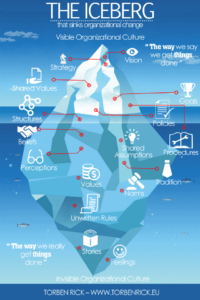 In my professional career, I have experienced something that is common, but still makes me wonder. I often find myself being the first. Whether it is the first in a specific department, or the first in an entire organization, the experiences are similar. The first I am speaking of is being the first African-American. In settings where individuals have little experience with one another, the tendency is to operate from a set of generalizations and assumptions about a specific group. This type of relational process was investigated in a study which addressed academic success in schools: “In the absence of prior contact with a person or institution, participants may rely on the general reputation of the other, and also on commonalities of race, gender, age, religion or upbringing….The more interaction parties have over time, the more willingness to trust one another is based upon the party’s actions,” (Brewster & Railsback, 2003). When you are first, you know it.
In my professional career, I have experienced something that is common, but still makes me wonder. I often find myself being the first. Whether it is the first in a specific department, or the first in an entire organization, the experiences are similar. The first I am speaking of is being the first African-American. In settings where individuals have little experience with one another, the tendency is to operate from a set of generalizations and assumptions about a specific group. This type of relational process was investigated in a study which addressed academic success in schools: “In the absence of prior contact with a person or institution, participants may rely on the general reputation of the other, and also on commonalities of race, gender, age, religion or upbringing….The more interaction parties have over time, the more willingness to trust one another is based upon the party’s actions,” (Brewster & Railsback, 2003). When you are first, you know it.
Almost 10 years ago, our nation experienced a significant first. When Senator Obama became President, our country entered a new way of being in the world. If our country had any reason to be celebratory, then this was it. Even with our disordered and painful history concerning race, we elected our first African-American president! But take a look at some of the other things that occurred during that time. There were nooses displayed on college campuses, Google searches for the n-word spiked, stuffed dolls were hung reminiscent of our country’s lynching history, and many other responses to a change in the original pattern. Although there was much to celebrate in our progress, there was much support that our institution needed from us to assist it through its first.
A couple weeks ago, I attended the reception of Waco ISD’s first African-American superintendent, Dr. Marcus Nelson. In his address to a very welcoming audience, he was engaging, transparent, and candid about his strong belief in serving children and his commitment to their future. The room was filled with so much hope that evening. As Dr. Nelson recalled the shock and pride among the elders he recently met along the route of the Juneteenth Parade, I recalled that same type of pride I witnessed among elders as I waited in line the six hours to cast my vote on Election Day in 2008. Our elders were experiencing a reality they thought they secured for their grandchildren- not expecting to taste it in their lifetime. I understood that their tears, and their hope was a debt already paid. And it was mine to do the work of this hour.
Whenever we break patterns that have been similar for a long time (like the pattern of U.S. Presidents), it is important for us to pay attention to the things that are also happening around that shift. When Senator Obama was elected President, it not only meant something but it also did something. Systems do not change easy, and the unwritten rules of their arrangements critically deserve our attention in times of change. As I welcomed Dr. Nelson with pride, hope, and expectation, I also committed to pay close attention to what our district would need from us during its institutional first. We have reason to celebrate, but we also must remember that as our institution is going through a first, it will be our willingness to have direct contact and conversation with one another that will make the biggest difference. And while we’re at it, let’s make these kinds of things normative. It’s such a great time be in Waco!
Welcome, Dr. Nelson! We’ve been waiting for you.
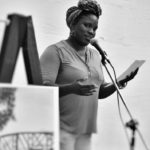 Elizabeth Ligawa is a recent graduate from Truett Theological Seminary, and the Diana R. Garland School of Social Work, earning both her Master of Divinity, and Master of Social Work. Though her prized role is being a mother to her dear son, Elijah, Liz has a love for encouraging people to come together in ways that engender healthy communities. Her role as the Director of Community Engagement at Prosper Waco allows her the room to work in and among the many faces of her beloved Waco community. She may be reached at [email protected].
Elizabeth Ligawa is a recent graduate from Truett Theological Seminary, and the Diana R. Garland School of Social Work, earning both her Master of Divinity, and Master of Social Work. Though her prized role is being a mother to her dear son, Elijah, Liz has a love for encouraging people to come together in ways that engender healthy communities. Her role as the Director of Community Engagement at Prosper Waco allows her the room to work in and among the many faces of her beloved Waco community. She may be reached at [email protected].
The Act Locally Waco blog publishes posts with a connection to these Aspirations for Waco. If you are interested in writing for the Act Locally Waco Blog, please email [email protected] for more information.
Reference
Brewster, C. & Railsback, J. (2003). Building trusting relationships for school improvement: Implications for principals and teachers. Oregon, USA: Northwest Regional Educational Laboratory.
